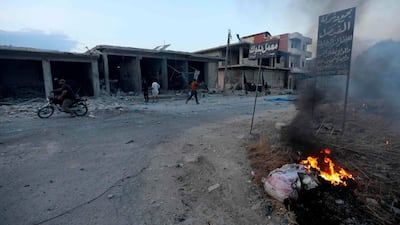Stark warnings that a humanitarian catastrophe is under way in Syria's Idlib shook the UN on Tuesday, yet the US and other leading states seemed powerless to stop Bashar Al Assad's offensive.
An urgent meeting was called by Germany, Kuwait and Belgium five days after a proclaimed ceasefire, advocated by Russia, was broken by further deadly attacks on hospitals in the last rebel-held territory in Syria.
UN officials who briefed the Security Council indicated that attacks by the Assad regime, including barrel bombs, and Russian air strikes were breaking international law, with civilians dying in increasing numbers.
Russia and Syria said they were fighting the UN-designated terrorist group Hayat Tahrir Al Sham.
Their ambassadors' remarks suggested that retaking the north-western province of Idlib was non-negotiable despite the complaints of council members.
The members have been repeatedly blocked by Russia's veto privileges.
UN Secretary General Antonio Guterres appealed to Moscow and Turkey, which has long backed the rebels, to stabilise the situation.
Russia and Turkey are signatories to a September 2018 de-escalation pact in Idlib, which has unravelled under pressure from the Assad regime's need to retake Idlib.
But Mark Lowcock, the UN's undersecretary general for humanitarian affairs, said the agreement was being ignored by Russia and the Syrian regime, and that at least 230 people died in bombings in the past six weeks.
Since May 1, almost 330,000 people were forced to flee their homes, Mr Lowcock said, with about 10 per cent of the population under threat because of the offensive.
He implied that Russia had abused its access to the locations of hospitals, which were shared to stop them being bombed, by launching air attacks on the sites.
“We are faced with a humanitarian disaster unfolding before our eyes. There is no denying the facts,” Mr Lowcock said.
Since he last briefed the council last month, eight hospitals had been targeted by air strikes, adding to two dozen already bombed.
“It is appalling that these sites were hit in the first place,” Mr Lowcock said. “But hitting a facility whose co-ordinates were shared as part of the UN's de-confliction mechanism is intolerable.
"A number of parties now feel that supplying geographical co-ordinates to be given to the warring parties effectively paints a target on their backs.
“Some have drawn the conclusion that hospital bombings are a deliberate tactic aimed at terrorising people.”
Rosemary DiCarlo, UN undersecretary general for political and peace-building affairs, said any talk of a ceasefire was belied by military action.
“Our unflagging efforts to mediate a political solution that meets the legitimate interests of the Syrian people cannot move forward in an environment of open conflict,” Ms DiCarlo said.
“Air strikes continue, barrel bomb use and cluster munitions, exchanges of mortar and artillery fire are ongoing, resulting in civilian casualties and massive displacement.
“It is imperative that we address HTS without triggering the humanitarian catastrophe that we see unfolding before our eyes, with hundreds of thousands on the move being pushed closer to Turkey's border.”
Despite six weeks of Syrian and Russian military action, the front lines around Idlib have barely moved, Ms DiCarlo said.
“If so, it is plainly turning out to be a bloody and quite pointless stalemate with devastating humanitarian consequences that far outstrip any damage done to HTS.”
Turkey's observation posts had been shelled by regime forces, leading it to retaliate with heavy weapons, she said.
Members of the council said civilians were suffering while Russia and Syria openly contravened international law.
“The fight against terrorism is not an excuse to target a school or a hospital,” said Belgium's permanent representative to the UN, Marc Pecsteen de Buytswerve.
Russia and Syria questioned the sources of the UN information, mainly quoted as World Health Organisation officials, yet failed to rebut the accusations against their military forces with any evidence.
Russia's ambassador to the UN, Vassily Nebenzia, then delivered a stark warning that unnerved several members of the council.
Mr Nebenzia claimed the White Helmets, a civil defence force in rebel-held areas, was preparing “false flag” chemical weapons operations in Idlib to implicate the Assad regime.
In past attacks where the US and other governments have said Syria used chlorine to poison civilians, Russia has claimed that western countries were responsible.
It has often accused the White Helmets of terrorism, an allegation that has drawn condemnation from council members.
Britain in particular has hit out at Russia for making unfounded claims designed to smear a volunteer force acting on behalf of Syrians under fire.
The US, Britain and France have said that any chemical weapons attacks by the Syrian government would be met with a forceful response.
"Such claims about false flag operations are disconcerting," a western diplomat told The National, saying the Assad regime appeared willing to do anything to reclaim Idlib.
The continuing battle for Idlib comes despite efforts by UN special envoy Geir Pedersen to find a political solution to the war, in which more than half a million people are estimated to have been killed.
But Syria's permanent representative to the UN, Bashar Jaafari, indicated there would be no let-up in the military campaign in Idlib, despite western condemnation of barrel bombings and other indiscriminate tactics.
In a long and at times rambling speech, Mr Jaafari suggested there would be no compromises over territory yet to be reclaimed by the regime.
“The Syrian government will not succumb to the terrorist war imposed on it,” he said.

